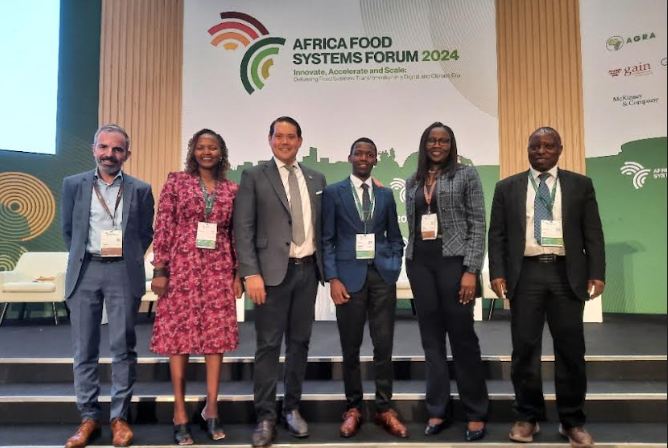
Smallholder farmers have been urged to adopt regenerative agriculture to enhance both productivity and economic sustainability.
During a panel discussion, agriculture experts emphasised the need for knowledge transfer, access to finance, inputs, and policies that support regenerative agriculture as critical goals for both industry partners and government agencies across Africa.
The panel discussion titled Regenerative Revolution: Building Sustainable Solutions for Smallholder Farmers took place in Kigali Rwanda.
It was held during the recently concluded Africa Food Systems Forum 2024. The Africa Food Systems Forum is an annual platform where industry stakeholders discuss, share, and shape the future of food systems across the African continent.
The panel discussion was hosted in partnership with Bayer, Opportunity International, and CGIAR’s International Potato Center. The event focused on new regenerative interventions across the agricultural value chain.
Regenerative agriculture is an evolution of conventional agriculture, reducing the use of water and other inputs, and preventing land degradation and deforestation.
It protects and improves soil, biodiversity, climate resilience and water resources while making farming more productive and profitable.
Speaking during the panel discussion, Mildred Nadah Pita, Head of Public Affairs and Sustainability Africa at Bayer emphasized the need for knowledge transfer, access to finance, inputs, and policies that support regenerative agriculture as critical goals for both industry partners and government agencies.
“One of the key challenges in transitioning to regenerative agriculture is demonstrating its value to smallholder farmers and showing how these practices can enhance both productivity and economic sustainability,” stated Nadah Pita.

Jens Hartmann, Bayer Crop Science Head of EMEA Region during the Africa Food Systems Forum 2024 held in Kigali, Rwanda
Samuel Nsengiymva, a young Rwandan farmer associated with AgriResearch Unguka, highlighted the importance of training and educating smallholder farmers in regenerative agriculture, stressing that partnerships and platforms are essential for knowledge sharing.
The panelists and audience discussed the importance of further collaboration and partnerships within the agricultural value chain to help smallholder farmers maximize the benefits of regenerative agricultural practices.
Jens Hartmann, Head of Bayer Crop Science EMEA, added, “Forging stronger partnerships is key to unlocking the potential of regenerative agriculture for smallholders. Producing more while restoring more is at the heart of regenerative agriculture, but it requires a concerted effort to support farmers already impacted by climate change.”
Why Regenerative Agriculture Matters
Smallholder farmers produce a third of the global food supply, with figures in some African countries reaching between 70%- 80%.
These farming communities face significant risks from poverty, climate change, and hunger. However, regenerative and adaptive agricultural practices are increasingly seen as a way to combat these challenges.
Jens Hartmann noted, “The acceptance and understanding of regenerative agriculture by smallholder farmers is crucial to Bayer’s mission of achieving Health for All, Hunger for None.”

Audience Feedback and Future Direction
An audience survey during the event revealed that farmers are eager for more knowledge on regenerative agriculture and its benefits, along with improved access to financing and markets.
Panelists stressed the need to enhance understanding and adoption of regenerative agricultural practices that maintain land productivity, restore natural resources, and mitigate climate change.
“We need to align efforts across research, knowledge transfer, and farmer enablement. African farmers are already implementing elements of regenerative agriculture that protect soil health, biodiversity, and water sources. These initiatives must be recognized, supported, and encouraged through agricultural policies,” concluded Mildred Nadah Pita.
Bayer is a global enterprise with core competencies in the life science fields of health care and nutrition. Its products and services are designed to benefit people by supporting efforts to overcome the major challenges presented by a growing and aging global population.
Bayer’s sustainability report tracks the progress towards four agricultural sustainability commitments that include reduction of on-field greenhouse gas emissions and limitation of the environmental impact of crop protection products.
The others are enabling smallholder farmers and reduction of water use.
For Bayer, regenerative agriculture is an outcome-based production system, where improving soil health is at its core aiming to increase resilience.
Other key aspects can be mitigation of climate change through greenhouse gas emissions reductions and increased carbon removals, maintaining, preserving, or restoring on-farm biodiversity, conserving water resources through improved water retention and decreases in water run-off, and improving the social and economic well-being of farmers and communities.
According to Bayer, regenerative agriculture is an outcome-based production system, where improving soil health is at its core aiming to increase resilience.
Other key aspects can be mitigation of climate change through greenhouse gas emissions reductions and increased carbon removals, maintaining, preserving, or restoring on-farm biodiversity, conserving water resources through improved water retention and decreases in water run-off, and improving the social and economic well-being of farmers and communities.

 © The Star 2024. All rights reserved
© The Star 2024. All rights reserved